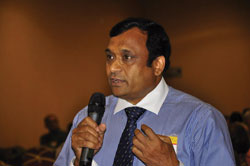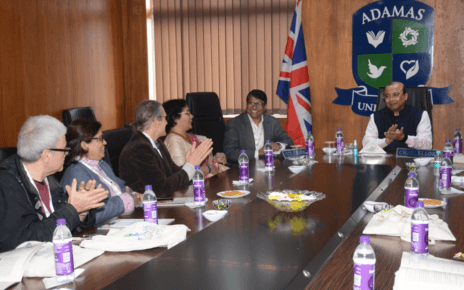When the board of trustees for the American Institute of Bangladesh Studies (AIBS) was faced with the decision of electing a new president this year, they voted in favor of keeping Dr. Golam Mathbor, professor of the School of Social Work at the University, for another four year term.
AIBS is a member of the Council of American Overseas Research Centers (CAORC), which, according to their website, “is a private nonprofit federation of independent overseas research centers (ORCs) that promote advanced research, particularly in the humanities and social sciences, with a focus on the conservation and recording of cultural heritage and the understanding and interpretation of modern societies.” Through CAORC, the AIBS maintains centers in Bangladesh, where they send scholars to conduct research in various fields.
The goal of AIBS is to help researchers travel to Bangladesh so they can study the numerous ways a developing nation progresses into a more advanced country. Mathbor said, “We provide grants for research, mainly to faculty members and doctoral students. Within the last 26 years, [AIBS has] sent 104 American citizens to conduct research in Bangladesh. Every year we send four to five researchers. In the past we’ve also let undergraduate students travel to Bangladesh with their professors.”
Bangladesh is an ideal landscape for such research, as Mathbor said, “It is one of the leaders in Sustainable Development Goals (SDGs). They have achieved all of the objectives of this goal, so there is a lot to learn for American faculty and students about how a developing country is coming along. Bangladesh is developing day to day; they’re maintaining a strong GDP as well. This is a wonderful opportunity for faculty members to bring back unique knowledge to share with their students.”
The areas studied through AIBS vary immensely, and continue to expand as more scholars become involved. Mathbor said, “we’ve done conferences on literature in our language, Bangla, climate change, 42 years of Bangladesh identity culture – it’s very widespread, not just for one concentration but all of them, really. Our community is open, we invite everyone to apply.” Their goal is to “promote the scholarly understanding of the United States and Bangladesh through the institutions of higher learning,” said Mathbor, so the institute is always looking for new fields of study to enlarge their educational web.
As president, Mathbor must represent AIBS during his service. Some of his duties include travelling to Bangladesh once a year, travelling to their office in Madison, Wisconsin once a year, and appearing in front of the U.S. Department of State once a year. He said, “there are about 24 institutes like AIBS in this country that are vital to US foreign policy. I have to present to the director of the Council of American Overseas Research Centers, our umbrella agency, at the U.S. Department of State in D.C. annually. We discuss what’s happening and what we need to do in the future; we learn from each other.”
When he is not running AIBS, Mathbor can be found buzzing around the School of Social Work at the University, sharing his knowledge and expertise with both students and faculty alike. Dr. Michael Cronin, associate professor of the School of Social Work, said “Dr. Mathbor has been a mentor to social work faculty teaching in the International & Community Development (ICD) concentration of the Master of Social Work program. His expertise in international development and disaster management has been influential in shaping the ICD curriculum. He has also been a longtime active participant in the International & Community Development Curriculum Committee, which I currently chair.”
Mathbor’s involvement with AIBS has proved to be endlessly beneficial to members of the University community. Cronin continued, “Dr. Mathbor has been a leader in promoting the scholarly understanding between Bangladesh and the United States, particularly in the area of international social work and development. He has facilitated visits from several scholars from Bangladesh who have guest lectured in the classroom and shared their professional expertise and research.”
Though Mathbor’s influence goes deeper than just education. Christina Addison, graduate student in the School of Social work, said, “Dr. Mathbor is an amazing professor. I always looked forward to his classes, and hearing his anecdotes that taught me how to further my career outside of the classroom.”
The presence of the AIBS at the University has provided a distinctive educational experience that allows both students and faculty to explore a facet of the world in ways unobtainable to many other institutions. Finally, Mathbor would like to extend a special thanks to Dean Robin Mama of the School of Social work, as he said, “for helping the AIBS exist at Monmouth University.”
IMAGE TAKEN by Jamilah McMillan



